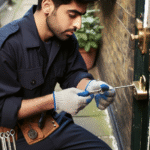Knowledge is the key to making sure that you’ve got the right coverage for your home. Knowing what’s in your insurance policies is imperative to understand what you need to protect your most valuable asset. And consumers make some really big mistakes when it comes to insurance.
Understanding Insurance Premiums
When you understand how premiums work, you can make informed decisions about your homeowners’ policy.

The way I best understand insurance is to compare it to my favorite casino game, blackjack, or 21. In simple terms, the insurance company is like the house. It always wins. That’s why they charge actuaries such big bucks, as they’re the ones who determine the odds.
The insurance premium is like the bet on each hand. It is an amount of money the insurance company charges for protecting your home against specific disasters. It’s calculated based on factors such as where you live, including how far you are from the nearest fire department and fire hydrant, or whether you live in an area that floods regularly, This risk, which the insurance company accepts, determines how much you will pay for certain coverage.
It’s always a good idea to shop around, and an insurance professional can assist with this. Insurance agents can find the same coverage for less with another insurance company prepared to take on certain risks.
Understanding Your Coverage
There’s often confusion about what home insurance covers. Homeowners’ insurance, for example, usually doesn’t cover damage from pests such as rodents or termites. Usually, you’d need to get special coverage to protect your home against something that could destroy it.
Home insurance also covers personal items on the premises, not just the structure. It also protects the homeowner against a certain amount of liability if someone is injured on the property. Your homeowners’ policy also covers theft out of your vehicle.

What may not cover, for example, is if you had a party at your home. If someone leaves the party under the influence of alcohol, and then injures or kills someone, you very well could be held liable. Which is yet another reason to take away people’s car keys, and to insist on designated drivers? Not having enough liability insurance is a common flaw with many homeowners’ coverage, and it can mean huge out of pocket expenses.
It covers for dog bites as well, though homeowners again should make themselves aware of how much liability coverage they have.
Shop Around
Investigating what companies offer the best rates in your area will help you save money on your premiums. Checking consumer websites or guides and with independent insurance agents can help you find the best coverage for the right price. Make sure, however, that the company offering a lower rate also provides quality coverage, as you don’t want to be fighting with the insurance company every time you make a claim. Ensuring that the company is stable financially is ultimately important as well.
Raising your deductible is a good way to save on premiums without sacrificing coverage. You can cover yourself for $100,000 worth of termite damage, but with a reasonable premium by making your deductible $5000. Though that amount might hit your pocketbook hard, it won’t hurt as much as having to pay the full hundred grand.
Getting certain coverage in disaster-prone areas is also a good idea. For example, if you live near the beach in Florida, getting flood insurance will protect your home against a storm surge in the event of a hurricane.
Also, remember to cover the replacement value. Take into account how much it would take to rebuild your home, and cover for that amount. You may pay a bit more, but the extra protection is worth it. You can also lower your premiums by making your home more disaster-resistant, installing a security system, and by maintaining a good credit record.
Know Your Limits
Knowing how much your homeowners’ insurance policy covers is important before a disaster hits. This is where getting the advice of a knowledgeable insurance agent makes good sense. Not having a high enough limit can leave you open to financial disaster, because if the policy doesn’t pay, you’ll have to.

Owning a home that you don’t occupy incurs greater risks. As the owner of a property, you’re much more likely to ensure that it stays in good shape. When a house is vacant, however, it may take a while before damage is noticeable. Or if you have someone renting the house, they are far less likely to care about its structure.
That’s why it’s so important to have adequate liability limits on properties, even when you don’t occupy them. It’s important too to know how much insurance coverage you have for disasters such as floods, sewerage backups, and earthquakes., Make sure the limits on your coverage will still allow you to cover your costs.






